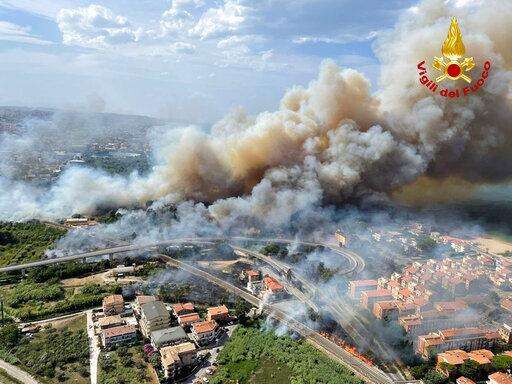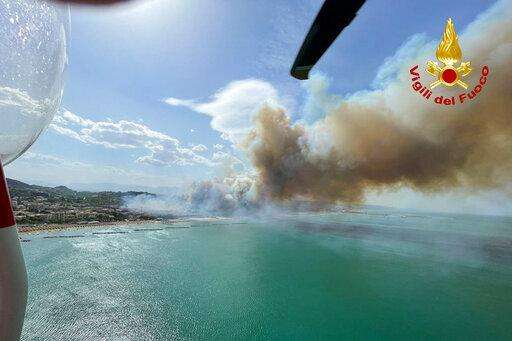A man walks away with his cows from an advancing fire in Cokertme village, in Bodrum, Mugla, Turkey, Monday, Aug. 2, 2021. For the sixth straight day, Turkish firefighters were battling Monday to control the blazes tearing through forests near Turkey's beach destinations. Fed by strong winds and scorching temperatures, the fires that began Wednesday have left eight people dead and forced residents and tourists to flee vacation resorts in a flotilla of small boats.(AP Photo/Emre Tazegul)
The Associated Press
ATHENS, Greece (AP) - A heat wave baking southeast Europe has fueled deadly wildfires in Turkey and threatened the national power grid in Greece as governments scrambled Monday to secure the resources needed to cope with the emergency.
Temperatures reached 45 C (113 F) in inland areas of Greece and nearby countries and are expected to remain high for most of the week.
Battling deadly wildfires along its coastline for a sixth day, Turkey broadened an appeal for international assistance and was promised water-dropping planes from the European Union. The fires have been blamed for the deaths of eight people in recent days.
The help for residents in Turkey's fire-ravaged areas couldn't come soon enough. At the coastal village of Bozalan, resident Esra Sanli looked over at the blaze.
'œIt's burning. It's obviously burning. There's no plane, there's no helicopter, there are no (access) roads,'ť she said, sobbing. 'œHow is this going to be extinguished? How?'ť
In Greece, an emergency was declared in fire-hit areas on the island of Rhodes, which is near the Turkish coast. Workers with health conditions were allowed to take time off work, while Greek coal-fired power stations slated for retirement were brought back into service to shore up the national grid, under pressure due to the widespread use of air conditioning.
Pregnant and other vulnerable workers in North Macedonia were told to stay home.
Dann Mitchell, a professor of climate science at the University of Bristol, said this heat wave in southeast Europe 'œis not at all unexpected, and very likely enhanced due to human-induced climate change.'ť
"The number of extreme heat events around the world is increasing year on year, with the top 10 hottest years on record all occurring since 2005,'ť Mitchell told The Associated Press.
'œThis year, we have seen a number of significant events, including a particularly dramatic heat wave in western Canada and the U.S., that was extreme even for current levels of climate change," Mitchell said. "These black swan events have always happened, but now they sit on the background of a hotter climate, so are even more deadly.'ť
As hot weather edged southward, Italy and Croatia were experiencing storms as well as wildfires. A small tornado in Istria, on Croatia's northern Adriatic coast, toppled trees that destroyed several cars, hours before a large wildfire erupted outside the nearby resort of Trogir, threatening homes and the local power supply.
Some 30 people were treated for light smoke inhalation in Italy's coastal city of Pescara after flames tore through a nearby pine forest. Beach-goers nearby had to be rescued by sea Sunday from that wildfire.
'œThat zone of pine forest is a nature reserve, and it's completely destroyed. It brings tears to see it. The environmental damage is incalculable. This is the heart of the city, its green lung and today it is destroyed,'ť Pescara Mayor Carlo Masci said.
Cyprus, recovering from a major wildfire last month, kept water-dropping planes on patrol to respond to fires as they broke out.
'œIf you don't react right away with a massive response to any outbreak, things can turn difficult quickly,'ť forestry service chief Charalambos Alexandrou told state-run media. 'œThe conditions are war-like.'ť
On a visit to the power grid operator Monday, Greek Prime Minister Kyriakos Mitsotakis urged members of the public to avoid daytime use of ovens, washing machines and other energy-demanding appliances to reduce the risk of blackouts. He described the weather conditions in Greece as the most severe since a deadly heat wave in 1987.
It was the year that Ioanna Vergou, deputy mayor of the northern Greek town of Skydra, was born. The town of 5,500 briefly ranked among the hottest in the country. She said municipal workers had been given earlier shifts and those needing public services were handed water and sent to an air-conditioned waiting area.
'œMany people here have compared the heat wave to what happened in 1987,'ť she said. 'œBut hopefully it will be easier this time round. We are all just waiting for it to pass.'ť
___ Mehmet Guzel reported from Cokertme, Turkey and Colleen Barry reported from Milan, Italy. Suzan Fraser in Ankara, Turkey, Ayse Wieting in Istanbul, Dusan Stojanovic in Belgrade, Serbia, Menelaos Hadjicostis in Nicosia, Cyprus, and Konstantin Testorides in Skopje, North Macedonia also contributed. ___
Follow all AP stories about climate change issues at https://apnews.com/hub/Climate
People move away from an advancing fire in Cokertme village, in Bodrum, Mugla, Turkey, Monday, Aug. 2, 2021. For the sixth straight day, Turkish firefighters were battling Monday to control the blazes tearing through forests near Turkey's beach destinations. Fed by strong winds and scorching temperatures, the fires that began Wednesday have left eight people dead and forced residents and tourists to flee vacation resorts in a flotilla of small boats.(AP Photo/Emre Tazegul)
The Associated Press
People run away from the fire-devastated Sirtkoy village, near Manavgat, Antalya, Turkey, Sunday, Aug. 1, 2021. More than 100 wildfires have been brought under control in Turkey, according to officials. The forestry minister tweeted that five fires are continuing in the tourist destinations of Antalya and Mugla. (AP Photo)
The Associated Press
A firefighter looks on, in the fire-devastating Sirtkoy village, near Manavgat, Antalya, Turkey, Sunday, Aug. 1, 2021. More than 100 wildfires have been brought under control in Turkey, according to officials. The forestry minister tweeted that five fires are continuing in the tourist destinations of Antalya and Mugla. (AP Photo)
The Associated Press
People run away as the wildfires engulf an area near the seashore, forcing people to be evacuated by boats, in Bodrum, Mugla, Turkey, Sunday, Aug. 1, 2021. Wildfires in the Turkish holiday destinations of Antalya and Mugla are still raging as firefighters worked to battle the blazes for a fifth day. Authorities warned tourists and residents to keep evacuating Turunc, a town in the seaside resort of Marmaris, and navy ships waited in the sea there to see if a bigger evacuation was needed. (Ismail Coskun/IHA via AP)
The Associated Press
An aerial view of the burning Sirtkoy village, near Manavgat, Antalya, Turkey, Sunday, Aug. 1, 2021. More than 100 wildfires have been brought under control in Turkey, according to officials. The forestry minister tweeted that five fires are continuing in the tourist destinations of Antalya and Mugla. (AP Photo)
The Associated Press
A woman drinks water during a heatwave at a beach, in Alimos suburb, southern Athens, Greece, Monday, Aug. 2, 2021. The heat wave is expected to peak Monday, with temperatures inland ranging from 42 to 46 degrees Celsius (107.6 to 114.8 Fahrenheit). Temperatures will remain at 40 Celsius (104 Fahrenheit) or above in much of Greece until at least Friday, meteorologists say. (AP Photo/Michael Varaklas)
The Associated Press
A man floats in the sea during a heatwave, in Alimos suburb, southern Athens, Greece, Monday, Aug. 2, 2021. The heat wave is expected to peak Monday, with temperatures inland ranging from 42 to 46 degrees Celsius (107.6 to 114.8 Fahrenheit). Temperatures will remain at 40 Celsius (104 Fahrenheit) or above in much of Greece until at least Friday, meteorologists say. (AP Photo/Michael Varaklas)
The Associated Press
Two men take a shower during a heatwave at a beach, in Alimos suburb, southern Athens, Greece, Monday, Aug. 2, 2021. The heat wave is expected to peak Monday, with temperatures inland ranging from 42 to 46 degrees Celsius (107.6 to 114.8 Fahrenheit). Temperatures will remain at 40 Celsius (104 Fahrenheit) or above in much of Greece until at least Friday, meteorologists say. (AP Photo/Michael Varaklas)
The Associated Press
In this photo released by the Italian Firefighters, a view of a violent wildfire that burned the historical pinewood in Pescara, central Italy, Sunday, Aug. 1, 2021. Sea resorts customers were seen running away as the flames were approaching the beach. More than 100 people were evacuated from their houses. A heat wave across southern Europe, fed by hot air from North Africa, has led to wildfires across the Mediterranean, including on the Italian island of Sicily and in western Greece. (Italian Firefighters via AP)
The Associated Press

In this photo released by the Italian Firefighters, a view of a violent wildfire that burned the historical pinewood in Pescara, central Italy, Sunday, Aug. 1, 2021. Sea resorts customers were seen running away as the flames were approaching the beach. More than 100 people were evacuated from their houses. A heat wave across southern Europe, fed by hot air from North Africa, has led to wildfires across the Mediterranean, including on the Italian island of Sicily and in western Greece. (Italian Firefighters via AP)
The Associated Press

In this photo released by the Italian Firefighters, a view of a violent wildfire that burned the historical pinewood in Pescara, central Italy, Sunday, Aug. 1, 2021. Sea resorts customers were seen running away as the flames were approaching the beach. More than 100 people were evacuated from their houses. A heat wave across southern Europe, fed by hot air from North Africa, has led to wildfires across the Mediterranean, including on the Italian island of Sicily and in western Greece. (Italian Firefighters via AP)
The Associated Press
A man carries his dog during a heatwave at a beach, in Alimos suburb, southern Athens, Greece, Monday, Aug. 2, 2021. The heat wave is expected to peak Monday, with temperatures inland ranging from 42 to 46 degrees Celsius (107.6 to 114.8 Fahrenheit). Temperatures will remain at 40 Celsius (104 Fahrenheit) or above in much of Greece until at least Friday, meteorologists say. (AP Photo/Michael Varaklas)
The Associated Press